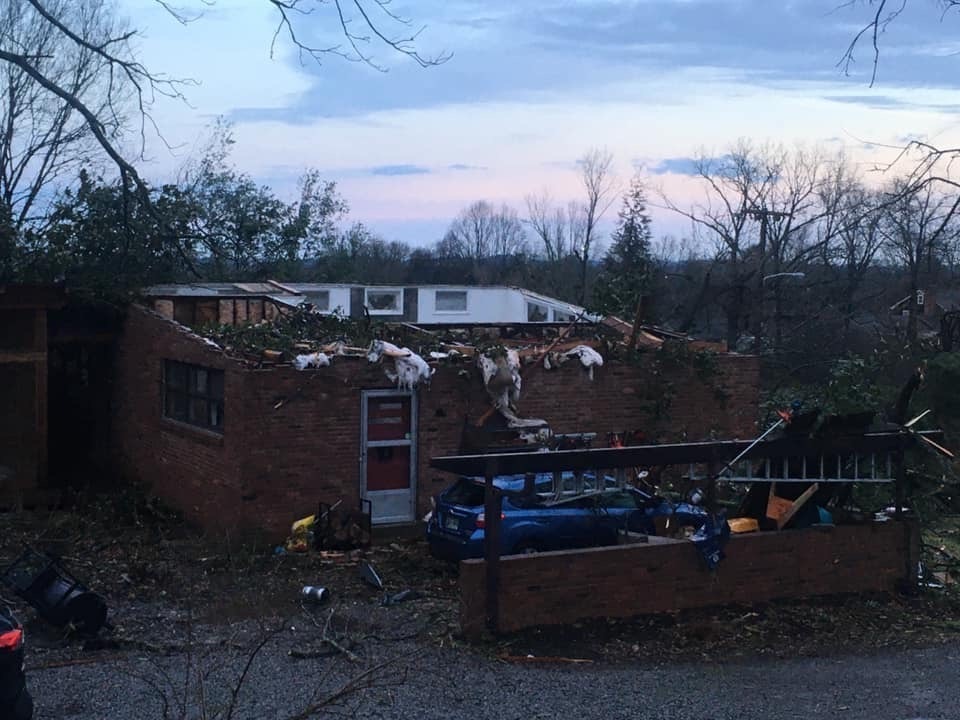
The night still runs on a loop in my brain, resurfacing too many times a day to count. Especially that particular moment, when the tornado peeled off our roof like the top of a sardine can as I held my son, debris flying, running for the basement. It’s nearly a year later and we’re still not home, so everything reminds me of the storm — our cramped rental, my lost running shoes, my missing meat thermometer. Then there’s the fact that our 2-year-old keeps asking about “the broke house.”
When the memory inevitably bubbles up, a strange sense of longing comes over. Longing for when only one disaster twisted around me. But just two days after the tornado hit, Gov. Bill Lee delivered the next round of bad news: Tennessee had its first confirmed case of COVID-19.
I’d felt such a connection to my community after the tornado hit. The friends and neighbors and strangers who had cleaned my yard of the debris, packed up the remains of our belongings, offered us places to stay — they were a lifeline. If normalcy wasn’t there, at least kindness and civility was. After the virus arrived, the generous bands of volunteers who had roved the streets with chainsaws and free sandwiches retreated.
Now, neighbors waved to each other from a distance. Schools closed. Navigating a grocery store became a risk to weigh carefully. Suddenly home became everything: your office, your classroom, your social life, your place of worship.
But what if you didn’t have your “home”?
More: This story is part of a series marking the one-year anniversary of the 2020 tornadoes. Visit the series page here.
For those of us dislocated by the tornado and then again by the pandemic, this has been a disaster year. Add to that being the working mother of a toddler, now without daycare, and you’ve got a recipe for a pillow to scream into and strong night cap, or two, or three.
Still, I carried on. We carried on. What choice did we have? And by “we,” I mean all of us. You know who you are.
Every day felt more isolating. More depleting. And there was no ending in sight.
As my husband and I spent months battling with insurance over what we needed to rebuild, we watched our beloved home, like a maimed family member we couldn’t tend to, mold and become waterlogged in the unrelenting southern summer. When the city money ran out for extra police patrols in our neighborhood, six months after the storm, burglars promptly descended. They broke down our doors, twice, stole our tools and lawn equipment, took an angle grinder to our storage unit. The desperation in this city was palpable.
It still is. A year after the tornado ripped across three counties, killing 25 people and destroying more than a thousand homes and buildings, much and little has changed. On my block alone, one house has been razed and rebuilt from scratch, while another still has plywood boarding the windows and tarps over the roof, not one inch of movement since a year ago.
And my neighborhood isn’t an outlier. In the historically Black neighborhood of North Nashville, generational family homes are being eyed by developers hungry for a deal in the rapidly gentrifying area. Many families have stuck around, determined to hold on to the family home and slowly making repairs with the help of the city’s tornado recovery program. In Putnam County, where the tornado unleashed particular fury — enough to kill 19 people, including five children — rebuilding is just as spotty. One family simply couldn’t bear to rebuild, it was too emotional. Another did, but with 12-inch-thick concrete walls for protection. I understand that urge. In our new home, we added twice the number of roof anchors that city code requires.
Overall, rebuilding has been achingly slow. Here in Davidson County, repairs haven’t begun on about a quarter of the hardest-hit buildings. A year later, the tornado is still very much among us. But that hasn’t stopped the catastrophes from coming.
When I awoke Christmas morning to a vibration that rattled our roof, again, my hairs stood up. The acute sense of looming misfortune has gotten into my bones. Trauma will do that.
I often wonder if there is comfort to be found in all the collective suffering — of a year spent navigating one disaster after the next. Is there something to gain from shared tragedy? In the days following the tornado, I wrote about how I’d received love and comfort from all types — evangelical Christians, Baptists, Anglicans, Trump supporters, liberals, atheists. Yet the months that followed seem to gut all that. We splintered even more. Over masks. Over candidates. Over truth. What saddens me most, amidst this wreckage, is our squandered opportunity for empathy.
Because in truth, we’ve shared so much.
The tornados and the pandemic shattered our personal and public spaces and pushed us to the brink of our sanity. But redemption always finds a way in. The past year bore other, less bitter fruit. A renewed and more intentional reckoning with racism. The first American astronaut launched into space from U.S. soil in almost a decade. A sledding panda. A life-saving vaccine. I want to spend the next year coming back together, reconnecting with each other, as Americans, as allies, as survivors.

